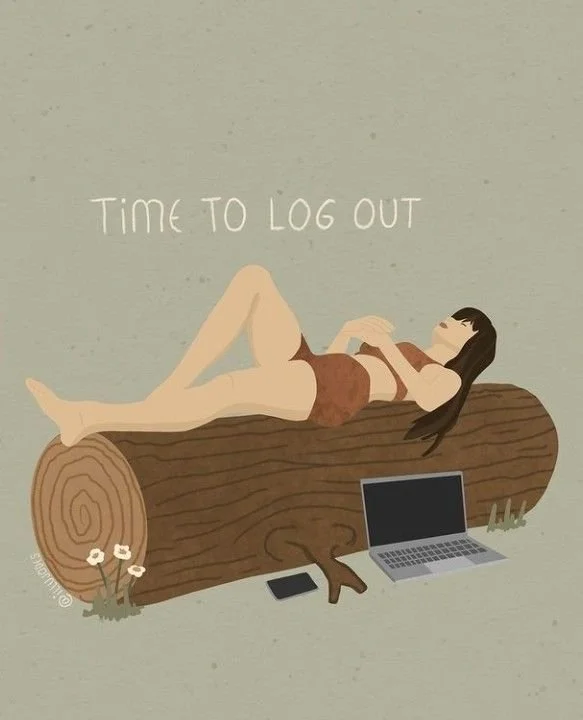When was the last time you went a full hour without checking your phone, glancing at a screen, or responding to a notification? If you're struggling to remember, you're experiencing what researchers are calling "continuous partial attention"—and you're definitely not alone.
The Screen Time Reality Check
The average American now spends over 7 hours a day staring at screens. That's more time than we spend sleeping. But here's the kicker: most of us drastically underestimate our actual usage. While people guess they spend about 2-3 hours on their phones daily, smartphone data reveals the truth is closer to 4-5 hours.
We've become digital zombies without even realizing it.
Our brains weren't designed for this constant stimulation. Every ping, buzz, and notification triggers a small stress response, flooding our systems with cortisol and adrenaline. Over time, this creates a state of chronic low-level anxiety that many people mistake for their baseline normal.
The Mental Fog Epidemic
Ever feel like our brains are wrapped in cotton? Like we're thinking through molasses? Welcome to digital overload syndrome. Our prefrontal cortex—the brain region responsible for focus, decision-making, and deep thinking—is being hijacked by the dopamine hits from constant digital stimulation.
Think of our attention spans like muscles that have been doing rapid-fire bicep curls for 12 hours straight. By the end of the day, they're exhausted and can barely lift a coffee cup, let alone tackle complex problems or engage in meaningful conversation.
This is where digital detox hours come in, not as punishment, but as restoration.
The Science Behind Screen-Free Time
Research from the University of California, Irvine, found that it takes an average of 23 minutes and 15 seconds to fully refocus after a digital interruption. That means if you check your phone every 10-15 minutes (which most people do), you're never actually reaching a state of deep focus.
But here's the fascinating part: studies show that even one hour of complete digital disconnection can:
Increase sustained attention by up to 40%
Improve memory consolidation and learning retention
Reduce stress hormones like cortisol significantly
Boost creative problem-solving abilities
Enhance emotional regulation and empathy
Our brains use screen-free time to activate what scientists call the "default mode network"—a neural pathway that's essential for creativity, self-reflection, and making connections between ideas.
The Relationship Revolution
Perhaps the most profound impact of digital detox hours isn't what happens in your brain, but what happens in your relationships. When you're not competing with a smartphone for attention, something magical occurs: you start actually seeing the people around you.
Real eye contact returns. Conversations deepen. You notice facial expressions, body language, and emotional subtleties that disappear when you're half-focused on a screen.
Parents report more meaningful connections with their children. Couples rediscover the art of uninterrupted conversation. Friendships strengthen when people feel truly heard rather than competing with Instagram notifications.
Starting Your Digital Detox Practice
The One-Hour Challenge: Begin with just one hour of complete digital disconnection daily. Here's how to make it sustainable:
Choose Your Golden Hour
Morning option: The first hour after waking up (before checking emails or news)
Evening option: The hour before bed (promoting better sleep)
Midday option: During lunch or afternoon break (mental reset time)
Create Physical Barriers
Put devices in another room. The simple act of having to walk somewhere to check your phone reduces usage by an average of 25%. Use a traditional alarm clock instead of your phone to avoid the temptation of "just checking one thing."
Fill the Void Intentionally Don't just remove screens—replace them with something fulfilling:
Read a physical book or magazine
Take a walk without podcasts or music
Practice a hobby that requires focus (cooking, gardening, drawing)
Have an actual conversation with someone
The Compound Effect of Mental Clarity
Users who stick with digital detox hours for just two weeks report remarkable changes:
Week 1: Initial restlessness gives way to surprising peace. Many people discover they've forgotten how to be still.
Week 2: Focus begins to sharpen noticeably. Reading comprehension improves. Conversations feel more engaging.
Month 1: Creative thinking resurges. Problem-solving abilities enhance. Sleep quality typically improves dramatically.
The Long Game: Regular practitioners report feeling more present, less anxious, and significantly more satisfied with their relationships and work quality.
Beyond Personal Benefits: The Ripple Effect
When you model healthy digital boundaries, you permit others to do the same. Children learn that constant connectivity isn't normal or necessary. Colleagues begin to respect boundaries around after-hours communication. Friends start suggesting phone-free activities.
You become a catalyst for others to reclaim their attention.
The Resistance We'll Face (And How to Handle It)
Our brains will resist this change. We'll experience what researchers call "nomophobia"—the fear of being disconnected from our phones. This is normal and temporary.
Common challenges include:
FOMO (Fear of Missing Out): What if something important happens?
Phantom vibrations: Feeling your phone buzz when it hasn't
Boredom panic: Not knowing what to do without digital stimulation
Social pressure: Others expecting immediate responses
Remember: Emergencies existed before smartphones, and people managed just fine. True urgencies are rare, and most "important" messages can wait an hour.
The Future of Focus
As digital overwhelm becomes increasingly recognized as a public health issue, digital detox hours represent more than just a wellness trend—they're a necessary life skill.
The companies designing our apps and devices employ teams of neuroscientists specifically to capture and hold your attention. Fighting back isn't about rejecting technology; it's about using it intentionally rather than being used by it.
One hour a day of digital freedom isn't just self-care—it's radical resistance against attention hijacking.
Your brain, your relationships, and your overall quality of life will thank you. The question isn't whether you have time for a digital detox hour—it's whether you can afford not to take one.
Start today. Start with one hour. Watch what happens when you give your mind permission to wander, wonder, and reconnect with the analog world that's been patiently waiting for your return.

